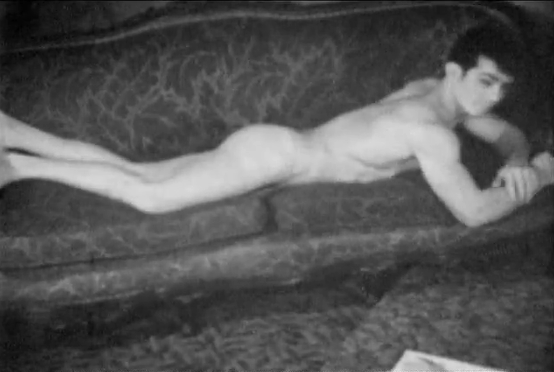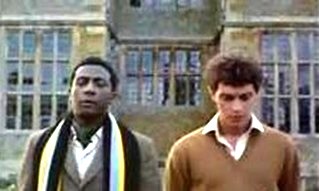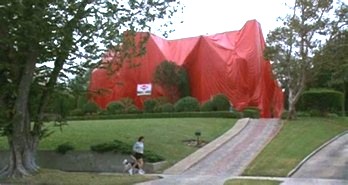making a difference
by Douglas Messerli
Luchina Fisher (screenwriter and director) The
Dads / 2023 [10 minutes] [documentary]
Luchina Fisher’s documentary concerns the
meeting up of five fathers, Peter Betz, Stephen Chukumba, Frank Gonzales, Wayne
Maines, and José Trujillo with a the very famous father Dennis of the brutally
murdered young gay man Matthew Shepard.
These fathers are not here, in fact, as supporters of young gay men who
have come out of the closet, but of transgender sons and daughters. Fisher
herself the mother of a trans child and the director of Mamma Gloria
(2020), a film about Gloria Allen, a septuagenarian trans woman from the south
side of Chicago, knew of some of the fathers’ love of the outdoors. As Fisher
relates it in an interview from 1923 with Stephen Saito in 2023:
“Apparently, Dennis Shepard, Wayne Maines, and
Frank Gonzales had been talking for some years about going on a trip together.
They all are avid outdoorsmen. They like to hunt, they like to fish, they like
to camp. And I knew them from the Human Rights Campaign’s Parents for
Transgender Equality Council — we had all been together at A Time to Thrive,
which is the youth gathering for the Human Rights Campaign, where they bring in
all these kids from all over the country, and I overheard Dennis, Wayne and Frank
talking about this trip, and I was like, “I want to go on that with you. Can I
bring cameras?” [laughs] “I just would love to be a fly on the wall to hear the
conversations you’re going to have.”
Accordingly, Fisher joined them on their fishing trip in Broken Bow,
Oklahoma, where for long moments he simply watched the men fish and later dish
up the fresh fish they have caught. One might almost describe this as an
all-male cooking fest for men who like the rugged life, except that their
dinner conversations are not about sports and women, but rather, as Saito
nicely describes it:
“It turns out it’s the first time back out on
the water for Dennis Shepard, the most well-known father in the group who
hasn’t handled a fishing rod since a family gathering in the Big Horns in 1998,
the last for his child Matthew, who died tragically shortly after, and while
the men assembled can take great comfort in one another, Fisher captures an
emotionally charged weekend where they swap stories about regrets they have
personally about forcing certain gendered items like clothing and sports on their
kids before gaining a full understanding of what they were going through and
some of the advice they received from therapists for better or worse. When such
a dialogue is relatively new amongst parents, let alone society as a whole, The
Dads is bound to spark more conversation as it presents its title
characters working through issues that they surely never thought they’d
encounter but all come back to loving their children unconditionally, showing
simply that acceptance doesn’t have to be all that difficult.”
These men, all now totally devoted to their transgender sons and
daughters, related not only their early mistakes and the pain for both their
children and the family they had to embrace during their transformations, but
worry about the increasing hostility throughout the nation toward transgender
individuals. These men break all stereotypes, as they go about enjoying what
men are “supposed” to enjoy in red states at the very same moment that tears
well up in their eyes when they confess their own failures at raising their
children to be their birth gender while their boys and girls were suffering for
that very identification.
James Kleinmann in Queer Review observes: “The
mischaracterization, dehumanization, and rejection of their trans children by
some, and fears for their kids’ safety just because of who they are, has
fundamentally changed their perception of what it means to be an American,
where not everyone is afforded the equal treatment promised.”
One might wish to hear even more about how these men each came to accept
their child in a world where so many fathers like them have not been able to.
We long to know if and how these men’s sensibilities were able to embrace what
so many “rugged outdoorsmen” and just plain bigoted fathers cannot. Was it
their upbringing, their education, their social-economic situations, or their
overwhelmingly deep love of their kids that permitted them to not only accept
their transgender children but to take pride in their children’s courage and to
continue to rally for them in just such meetings and through the several
transgender rights organizations which they have collectively joined?
We
not only admire someone like Shepard for having become an advocate for gay
rights but also participating with the seemingly unrelated offshoot of
transgender concerns.
Fisher truly does participate as a cinematic “fly on the wall,”
seemingly objectively filming their conversations and observing their pleasures
just to get together and talk. In a time when hate groups of all kinds have
chosen transgender rights as a rallying cry against sexual difference, this
film is particularly important. And I was pleased to read the Netflix had
picked it up for showing at their influential site and that it finishes its
runs at LGBTQ+ festivals such as NewFest where I saw it.
Los Angeles, October 19, 2023
Reprinted from World Cinema Review (October
2023).














